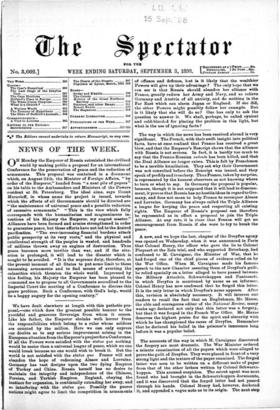A new, and we hope the last, chapter of the
Dreyfus agony was opened on Wednesday, when it was announced in Paris that Colonel Henry, the officer who gave the lie to Colonel Picquart at the Zola trial, and who supported Esterhazy, had confessed to M. Cavaignac, the Minister of War, that he had forged one of the chief pieces of evidence relied on by the War Office. When M. Cavaignac made his famous speech to the new Chamber assuring them of Dreyfus's guilt, he relied specially on a letter alleged to have passed between the Military Attaches, Schwartzkoppen and Panizzardi, in which Dreyfus is mentioned by name as an informer. Colonel Henry has now confessed that he forged this letter. It is the only letter in which Dreyfus's name appears. After this, revision is absolutely necessary. It will interest our readers to recall the fact that an Englishman, Mr. Maxse, the able and courageous editor of the National Review, many weeks ago declared not only that this letter was a forgery, but that it was forged in the French War Office. Mr. Maxse deserves the highest praise for the spirit and sincerity with which he has championed the cause of Dreyfus. Remember that he declared his belief in the prisoner's innocence long before it was a popular belief.


































